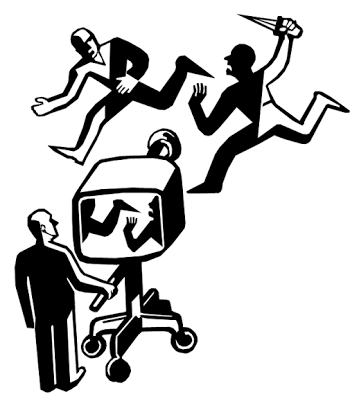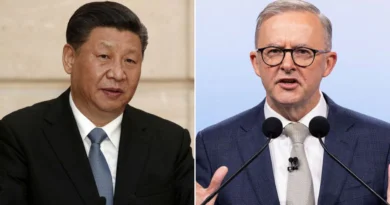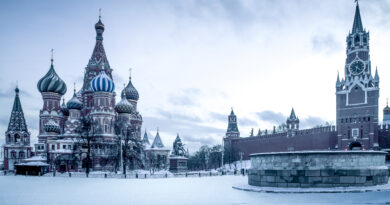Fifteen reasons why media employees act like propagandists
CAITLIN JOHNSTONE
If you look at the Western media with a critical eye, you end up noticing how their reporting consistently aligns with the interests of the US centralized empire, much as you would expect if they were government-run propaganda outlets.
The New York Times has endorsed systematically all wars wagedfor the United States. Western media are overwhelmingly focusedon foreign protests against governments the United States does not like, while paying far less attention to widespread protests against US-aligned governments. The only time Trump was universally showered with praise from the media was when bombed syria, while the only time Biden has been universally slammed by the media was when withdrew from afghanistan. The American media did such a good job of misleadingly linking Saddam Hussein to the September's 11th attacks in the public minds in the run up to the invasion of Iraq that seven out of ten Americansthey continued to believe it was related to September's 11th months after the war began.
That this extreme bias occurs is obvious and indisputable to anyone paying attention, but why and how it occurs is harder to see. The uniformity is so complete and so consistent that when people begin to notice these patterns it is common for them to assume that the media must be controlled by a small, centralized authority, much like the state media of more overtly authoritarian governments. But if you really dig into the reasons why the media act the way they do, that's not really what you find.
Instead, what you find is a much broader and much less centralized web of factors tipping the balance of media coverage in favor of the US empire and the forces that benefit from it. Some of it is conspiratorial in nature and occurs in secret, but most of it is essentially out in the open.
Here are 15 of those factors.
1. OWNERSHIP OF THE MEDIA
The most obvious point of influence in the mass media is the fact that the mass media ttend to be property and be controlled by plutocrats whose wealth and power are based on the status quo from which they benefit.
Jeff Bezos is the owner of the Washington Post, which he bought in 2013 from the also immensely rich Graham family. The New York Times carries more than a century in hands of The same family. Rupert Murdoch owns a vast international media empire whose success is largely due to the U.S. government agencies with which you are closely interrelated. Media ownership has historically been an investment that can generate immense wealth, “like having a license to print your own money”, as Canadian television mogul Roy Thomson once said.
Does this mean that the wealthy media owners are above their employees and tell them what to report every day? No. But it does mean that they control who will run their outlet, which means that they control who will hire their executives and editors, who in turn control the hiring of everyone else in the outlet. Rupert Murdoch never stepped into the newsroom to announce the talking points and war propaganda of the day, but you have a slim chance of landing a job in Murdoch's press if you're a flag-burning anti-imperialist.
Which brings us to another related point:
2. “IF YOU BELIEVED ANYTHING DIFFERENTLY, YOU WOULD NOT BE SITTING WHERE YOU ARE”
In 1996, in a controversial discussion between Noam Chomsky and British journalist Andrew Marr, Chomsky mocked mainstream journalists' false image of themselves as "a profession of crusaders" who are "adversaries" and "stand up against power," stating that it is almost impossible for a good journalist to do so. significantly in the mass media of the Western world.
“How can you know that I self-censor?” Marr objected. "How can you know that journalists are...?"
"I'm not saying you self-censor," Chomsky replied. “I'm sure you believe everything you say. But what I'm saying is that if you believed something differently, you wouldn't be sitting where you are sitting."
With a 1997 essayChomsky added that "the thing is, they wouldn't be there unless they had already shown that no one has to tell them what to write because they're going to say the right thing anyway."
3. JOURNALISTS LEARN PRO-ESTABLISHMENT GROUPTHINK WITHOUT ANYONE TELLING THEM
This “you wouldn't be sitting where you're sitting” effect isn't just a theory of Chomsky's personal work; journalists who have spent time in the media have publicly acknowledged this to be the case in recent years, saying that they learned very quickly what kinds of exits will help and hinder their movement up the career ladder without needing to be told. say explicitly.
During his second run in the 2019 presidential primary, Senator Bernie Sanders angered the mainstream media with some comments he made accusing the Washington Post of reporting biased against him. Sanders' claim was entirely correct; during the hottest and closest point of the 2016 presidential primaries, Fairness and Accuracy In Reporting noted that WaPo had published no fewer than 16 slanderous articles about Sanders in the span of 16 hours. Sanders pointing out this truism sparked an emotional controversy about media bias that led to some quality testimonials from people in the know.
Among them, former MSNBC reporter Krystal Ball and former Daily Caller White House correspondent Saagar Enjeti, who explained the subtle pressures to adhere to a groupthink orthodoxy they had experienced in a segment of The Hill's Rising online show.
“There are certain pressures to get along with the establishment and maintain the access that is the lifeblood of political journalism,” Ball said in the segment. "What do I mean? Let me give an example from my own career as everything I'm saying here quite frankly applies to me as well. In early 2015 on MSNBC I did a monologue that some of you may have seen pretty much begging Hillary Clinton not to run. I said that her ties to the elite were not in step with the party and the country, that if she ran she would probably be the candidate and then she would lose. No one censured me, I was allowed to say so, but then the Clinton people called and complained to the higher ups at MSNBC and threatened not to give me any access during the next campaign. I was told that I could continue to say what I wanted, but that I would have to get the okay from the network president for any Clinton-related comments. Since I am a person interested in keeping my job, I am sure that after that I made less critical comments about Clinton than she would have done in other circumstances ”.
“This is something that a lot of people don't understand,” Enjeti said. “It is not necessarily that someone tells you how to do your coverage, it is that if you did it that way, they would not hire you in that institution. So if you don't fit into this framework, the system is designed not to give you a voice. And if you necessarily did, all the incentive structures around your salary, your promotion, your colleagues patting you on the back, all of that would go away. So it's a reinforcement system, which makes you not go down that path in the first place.”
“True, and again, not necessarily intentional,” Ball added. “It's just that those are the people you're surrounded by, so it becomes groupthink. And look, you're aware of what you're going to be rewarded for and what you're going to be punished for, or not rewarded, like it definitely plays in the mind, whether you want it or not, that's a reality."
During the same controversy, former MSNBC producer Jeff Cohen published an article in Salon titled “Memo to mainstream journalists: Can the phony outrage; Bernie is right about bias” in which he described the same “groupthink” experience:
“It happens because of groupthink. It happens because major publishers and producers know - without being told - what topics and sources are off limits. You don't need to give orders, for example, for grassroots journalists to understand that the business of the head of the company or major advertisers is off limits, barring criminal charges."
“You don't need any memos to achieve narrowness of perspective: select all the usual experts from all the usual think tanks to say all the usual things. Think Tom Friedman. Or Barry McCaffrey. Or Neera Tanden. Or any of the elite club members who have been proven absurdly wrong time and time again on national or global issues."
Matt Taibbi also jumped into controversy to highlight the groupthink effect of the media, publishing an article in Rolling Stone on how journalists come to understand what will and will not elevate their careers in the mass media:
“Journalists watch good investigative journalism on serious structural problems die on the stump, while mountains of column space are devoted to trivia like Trump tweets and/or glib partisan stories. No one needs to pressure anyone. We all know what is done and what is not done in newsrooms”.
And it's probably worth noting here that Taibbi is no longer with Rolling Stone.
4. THOSE WHO DO NOT CONFORM TO GROUP THINK WEAR OUT AND ARE PRESSURED TO LEAVE
Journalists learn to do the kind of reporting that will advance their careers in the mass media, or they don't learn and remain marginalized and ignored, or they burn out and quit. NBC reporter William Arkin he resigned from the network in 2019, criticizing NBC in a open letter for consistently being “in favor of policies that only mean more conflict and more war,” and complaining that the network had begun to “emulate the national security state itself.”
Arkin said he often found himself a "lone voice" scrutinizing various aspects of the US war machine, saying he "argued endlessly with MSNBC about all things national security for years."
“We have helped turn global national security into this sort of political story,” Arkin wrote. “I find it disheartening that we don't report the failures of generals and national security leaders. I find it shocking that we essentially condone America's continued bungling in the Middle East and now Africa through our bland reporting."
Sometimes the pressure is much less subtle. Pulitzer Prize-winning journalist Chris Hedges left The New York Times after receiving a formal written reprimand from the newspaper for criticizing the invasion of Iraq in a speech at Rockford College, realizing that he either stopped speaking publicly about what he believed in or would be fired.
“Either I would gag myself to pay allegiance to my career… or I would speak up and realize that my relationship with my employer was terminal,” he said. Hedges in 2013. “And at that point I left before they got rid of me. But I knew that, you know, I wasn't going to be able to stay."
5. THOSE WHO CROSS THE LINE ARE FIRED
This measure doesn't need to be applied often, but it does happen enough for people with careers in the media to get the message, like when Phil Donahue was fired from MSNBC for his opposition to the Bush administration's warmongering in the run-up to the invasion of Iraq despite having top ratings of any program on the network, or in 2018 when Temple University professor Marc Lamont Hill was fired from CNN for supporting freedom for Palestinians during a speech at the United Nations.
6. THOSE WHO FOLD TO THE LINE SEE THEIR CAREERS ADVANCE
In his 2008 book War Journal: My Five Years in Iraq, NBC's Richard Engel wrote that he did everything he could to get into Iraq because he knew it would be a huge boost to his career, calling his presence there during the war as his "big break."
"In the run-up to the war, it was clear that Iraq was a country where races were going to be made," Engels wrote. “I slipped into Iraq before the war because I thought the conflict would be the turning point in the Middle East, where I had already lived for seven years. As a young freelancer, I believed that some reporters would die covering the Iraq war, and that others would make a name for themselves.”
This gives us an idea of how ambitious journalists think about their career advancement, and also one of the reasons why they are always so enthusiastic about war. If you know that a war can advance your career, you wait for it to happen and do everything you can to facilitate it. The whole system is set up to elevate the worst kind of people.
Engel is now NBC's chief foreign correspondentIndeed.
7. IN THE PUBLIC AND STATE-FUNDED MEDIA, THE INFLUENCE IS MORE EVIDENT
So we've been talking about the pressures that are put on mass media employees in media run by plutocrats, but what about non-plutocrat owned mass media like NPR and the BBC?
Well, propaganda thrives in these institutions for more obvious reasons: their proximity to governmental powers. Until the 90s, the BBC allowed MI5 to investigate its employees for “subversive” political activities, and only officially changed that policy when they were caught. NPR's CEO, John Lansing, came directly from the official propaganda services of the United States government, since he had previously been director general of the United States Agency for Global Media, and it was not the NPR chief executive with extensive experience in the US state propaganda apparatus.
With US government-owned media like Voice of America, control is even more open than that. In a 2017 article with the Columbia Journalism Review titled “Spare the indignation: Voice of America has never been independent”VOA veteran Dan Robinson says that these types of outlets are totally different from normal news organizations and are expected to facilitate the news interests of the United States to receive government funding:
“I spent some 35 years at Voice of America, in positions ranging from chief White House correspondent to foreign bureau chief to head of a key language division, and I can tell you that two things have been true for a long time. . First, the US government-funded media has been seriously mismanaged, a reality that made it ripe for bipartisan reform efforts in Congress, which reached their apex in late 2016, when President Obama signed the National Defense Authorization Act of 2017. Second, there is widespread agreement in Congress and elsewhere that in exchange for continued funding, these government broadcasters must do more, as part of the national security apparatus. , to aid efforts to combat Russian, ISIS and Al-Qaeda disinformation."
8. ACCESS JOURNALISM
Krystal Ball addressed this issue in her anecdote about the influential MSNBC call from the Clinton camp. He access journalism refers to the way in which the media and reporters can lose access to politicians, government officials and other powerful figures if those figures do not perceive them as likable enough. If someone in power decides they don't like a certain reporter, they can simply decide to give their interviews to someone else who is fawning enough, or call someone else at the press conference, or have off-the-record and off-the-record talks with someone who does. the ball a little more.
Depriving hard-to-reach interlocutors channels all the precious media material to the most servile of the press, because if you have too much dignity to ask soft questions and not follow up on the ridiculous non-answers of language word salad politician, there is always someone else who will do it. This creates a dynamic in which bootlickers in the service of power are elevated to the top of the mainstream media, while genuine journalists who try to hold power to account go unrewarded.
9. RECEIVE “SCOOPS” FROM GOVERNMENT AGENCIES SEEKING TO PROMOTE THEIR INFORMATIONAL INTERESTS
In totalitarian dictatorships, the government spy agency tells the media what news to publish, and the media publishes it without question. In the Free Democracies, the government spy agency says "Ohhh, man, I've got a scoop for you!" and the media publish it without question.
Today, one of the easiest ways to break a major national security or foreign policy story is to have one or more government officials entrust you with a “scoop”—on condition of anonymity, of course—who happens to make the government look good and/or make its enemies look bad and/or consent to this or that agenda. Of course, this is simply the same as issuing press releases for the White House, the Pentagon, or the US intelligence cartel, since you are just uncritically repeating something unverified that an official has passed to you, disguising it as journalistic information. But it is an increasingly common practice in Western "journalism" as the need to distribute propaganda about Washington's Cold War enemies in Moscow and Beijing increases.
Some notable recent examples of this are the report completely discredited from The New York Times that Russia was paying Taliban-linked fighters to kill US and allied forces in Afghanistan, and the report completely discredited from The Guardian that Paul Manafort visited Julian Assange at the Ecuadorian embassy. Both were simply falsehoods that the media received from intelligence agents who were trying to seed a narrative into the public consciousness, which they then repeated as fact without ever revealing the names of those who gave them the false story. Another related example is that of US officials who admitted to NBC last year - again on anonymity - that the Biden administration was simply had been feeding with lies about Russia to the media in order to win an "information war" against Putin.
This dynamic is similar to that of access journalism, in that media outlets and reporters who have proven to be sympathetic parrots and uncritical of the government narratives fed to them are the most likely to receive them, and thus those who get the “scoop”. We found out what this looks like from the inside when the acting director of the CIA under the Obama administration, Mike Morell, testified that he and his intelligence cartel cohorts had initially planned to seed their disinformation operation on Hunter Biden's laptop to an unnamed private journalist at The Washington Post, with whom they presumably had a good working relationship.
Another twist in the “scoops” dynamic of intelligence cartels is the way in which government officials give information to a reporter from one outlet, and then reporters from another outlet contact those same officials and they ask if the information is true, and then all the media involved make a public parade on Twitter proclaiming that the report has been "confirmed". Nothing about the story was verified as true in any way; it was simply the same story told by the same source to different people.
10. CLASS INTERESTS
The more a media employee follows imperial groupthink, follows the unwritten rules, and doesn't pose a threat to the powerful, the higher he or she will rise in the media career. The higher they go up, the more money they will earn. Once they are in a position to influence a large number of people, they are part of a wealthy class that has a vested interest in maintaining the political status quo that allows them to keep their fortunes.
This can take the form of opposing anything resembling socialism or political movements that might make the wealthy pay more in taxes, as we saw in the virulent smear campaigns against progressive figures like Bernie Sanders and Jeremy Corbyn. It can also take the form of encouraging the public to fight a culture war lest they start fighting a class war. It can also take the form of making one more supportive of the empire in general, because that is the status quo on which their fortunes are built. It can also take the form of making one more sympathetic to politicians, government officials, plutocrats, and celebrities as a whole, because that class is what your friends are now; It's the one you go out with, whose parties and weddings you go to, the one you drink with, the one you laugh with, the one you gossip with.
Class interests dance with the behavior of journalists in multiple ways because, as have pointed Whether Glenn Greenwald or Matt Taibbi, journalists for the mass media increasingly come not from working-class backgrounds, but from wealthy families, and hold degrees from elite, expensive universities.
The number of journalists with university degrees it shot itself from 58% in 1971 to 92% in 2013. If your rich parents aren't paying that for you, then you have crushing student debt that you have to pay yourself, which you can only do in the field you studied in by earning an amount decent amount of money, which you can only do by acting as a propagandist for the imperial establishment in the ways we have been discussing.
Universities themselves tend to play a role in the service of the status quo and manufacturing of conformity in producing journalists, as wealth will not flow into an academic environment that is offensive to the rich. It is unlikely that moneyed interests will do large donations to universities who teach their students that moneyed interests are a plague on the nation, and they certainly aren't going to send their children there.
11. THINK TANKS
The Quincy Institute has published a new study according to which a staggering 85% of think tanks cited by the media in their reporting on US military support for Ukraine have been paid for by literal Pentagon contractors.
“In the United States, think tanks are a go-to resource for the media for expert opinion on pressing public policy issues,” writes Ben Freeman of the Quincy Institute. “But think tanks often have entrenched positions; a growing body of research has shown that your funders can influence your analysis and feedback. This influence can include censorship - both self-censorship and more direct censorship of work unfavorable to a funder - and pay-for-research arrangements with funders. The result is an environment in which the interests of the most generous funders can dominate the political debates of think tanks.
This is journalistic malpractice. It is never, ever, according to journalistic ethics to cite think tanks financed by war profiteers on matters of war, militarism or foreign relations, but the Western press does it constantly, without even disclosing this huge conflict of interest to its audience.
Western journalists cite imperially-funded experts because they generally align themselves with imperial-sanctioned lines that a media stenographer knows they can advance their career by pushing, and they do so because doing so gives them a "source." official-looking expert” to quote while proclaiming that more expensive war machine should be sent to this or that part of the world or whatever. But really there is only one story to be found in such quotes: "The war industry supports more war."
The fact that war profiteers are allowed actively influence in the media, politics and government agencies through think tanks, advertising and corporate lobbying is one of the most insane things happening in our society today. And it is not only allowed, but rarely even questioned.
12. THE COUNCIL ON FOREIGN AFFAIRS
It should probably also be noted here that the Council on Foreign Relations is a think-tank deeply influential, which counts a surprising number of influential media executives and journalists among its members, a dynamic that gives these centers another layer of influence in the media.
In 1993, former Washington Post editor and ombudsman Richard Harwood described approving the CFR as "the closest thing we have to a ruling establishment in America."
Harwood writes:
“The membership of these journalists on the council, regardless of how they view themselves, is recognition of their active and important role in public affairs and their rise to the American establishment. They are not limited to analyzing and interpreting the foreign policy of the United States; help to do it. Their influence, Jon Vanden Heuvel speculates in an article published in the Media Studies Journal, is likely to increase now that the Cold War is over: 'By focusing on specific crises around the world {the media are in a better position} to put pressure on the government to act.'”
13 ADVERTISING
In 2021, Politico was caught publishing a fawning apology for Lockheed Martin, a major arms manufacturer, at the same time that Lockheed was sponsoring a Politico newsletter on foreign policy. Eli Clifton of Responsible Statecraft wrote at the time:
“There is a very blurred line between Politico's financial relationship with the largest arms company in the United States, Lockheed Martin, and its editorial output. And that line may have become even more opaque."
Last week, Ethan Paul of Responsible Statecraft, reported that Politico was removing from its files any reference to Lockheed Martin's sponsorship of the publication's popular newsletter, Morning Defense. Although evidence of Lockheed's financial relationship with Politico has been erased, the popular media outlet has just released a lengthy article about the company, without any acknowledgment of the long financial relationship with Politico.
Politico did not respond to questions about whether Lockheed continued to sponsor the publication after it removed ads from the defense giant last month or whether the arms company paid for what looked largely like an advertorial.
Politico's Lee Hudson visited Lockheed's highly-secure and mostly classified Skunk Works research and development facility north of Los Angeles and wrote glowingly: “To defense technology journalists and geeks of aviation, this is the equivalent of a Golden Ticket to Willy Wonka's factory, but think supersonic drones instead of Everlasting Gobstoppers."
Have you ever wondered why you see ads for Northrop Grumman during the Superbowl? Do you think someone is seeing that ad saying “You know what? I'm going to buy a stealth bomber”? Of course not. The defense industry advertises in the media all the time, and while they may not always get caught red-handed blatantly manipulating news publications like Lockheed did with Politico, it's hard to imagine their money won't have a chilling effect on foreign policy reporting, and perhaps even give them some influence on editorial matters.
As Jeff Cohen said above: Major advertisers are off limits.
14. COVERT INFILTRATION
The fact that much of the propaganda behavior of the media can be explained without secret conspiracies does not mean that there are no secret conspiracies. In 1977, Carl Bernstein published an article titled "The CIA and the Media" in which he reported that the CIA had covertly infiltrated the most influential media outlets in the United States and had more than 400 journalists at their disposal. whom he considered to be active in a program known as Operation Mockingbird.
We are told that this type of covert infiltration no longer occurs today, but that is absurd. Of course it happens. People believe that the CIA no longer engages in nefarious behavior because they are comfortable believing it, not because there is any evidentiary basis for that belief.
The conditions that led to Operation Mockingbird in the 70s did not exist that do not exist today. Cold War? That happens today. Hot war? That is happening today. Dissident groups? It happens today. A mad race to secure US dominance and capital on the world stage? It happens today. The CIA was not dismantled and no one went to jail. All that has changed is that the media now has more things for government operatives to play with, such as online media and social media.
And indeed, we have seen evidence of that happening today. Back in 2014 Ken Dilanian, now a prominent NBC reporter, was caught collaborating closely with the CIA in their reports and sending them articles for approval and changes before publication. In his emails with CIA press officers, Dilanian is seen acting as a propagandist for the agency, talking about how he intended a story on CIA drone strikes to be "reassuring to the public" and editing his reporting. according to your wishes.
Other possible CIA assets include CNN's Anderson Cooper, who interned with the agency, and Tucker Carlson, whose past bears a highly suspect amount of overlaps with the CIA.
15. OPEN INFILTRATION
Finally, sometimes the media act as state propagandists because they are true state propagandists. In Carl Bernstein's time, the CIA had to secretly infiltrate the media; nowadays, the media openly hire members of the intelligence services to work among their ranks. The media openly employ intelligence agency veterans such as John Brennan, James Clapper, Chuck Rosenberg, Michael Hayden, Frank Figliuzzi, Fran Townsend, Stephen Hall, Samantha Vinograd, Andrew McCabe, Josh Campbell, Asha Rangappa, Phil Mudd, James Gagliano , Jeremy Bash, Susan Hennessey, Ned Price, and Rick Francona.
The media also often bring in “experts” to opine on war and weapons who are directly employed by the military-industrial complex, without ever explaining to their audience this huge conflict of interest. Last year Lever News published a report about how the media had been bringing in American executives who currently work for war profiteering companies as part of their life in the Washington swamp revolving door between the public and private sectors and presenting them as unbiased experts on the war in Ukraine.
So, as you can see, the media are under pressure from every conceivable angle and at every relevant level that pushes them to function not as reporters, but as propagandists. This is why Western media employees act as public relations agents for the Western empire and its constituents: because that is exactly what they are.
Caitlin Johnston is an Australian independent journalist, writer and poet who is supported by her readers. Her latest book, in collaboration with Tim Foley, is Woke: A field guide for utopia preppers.











